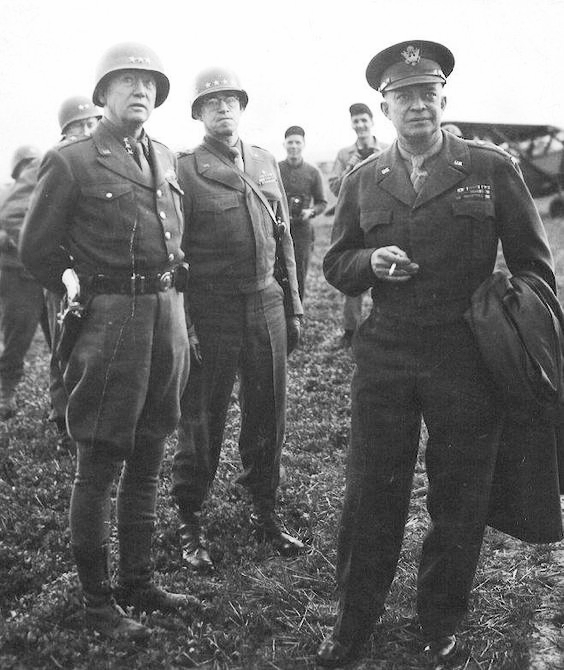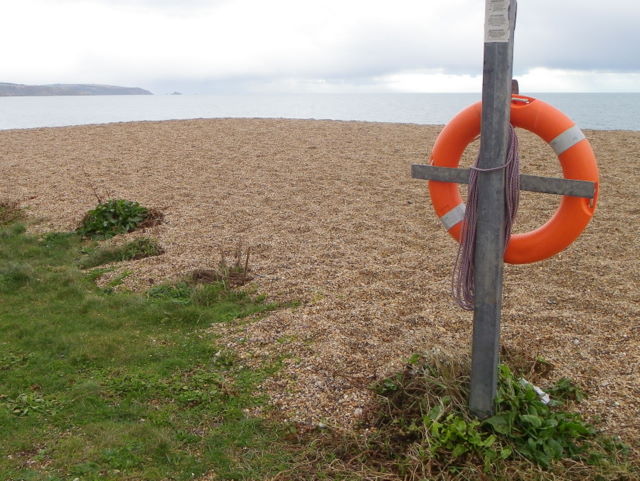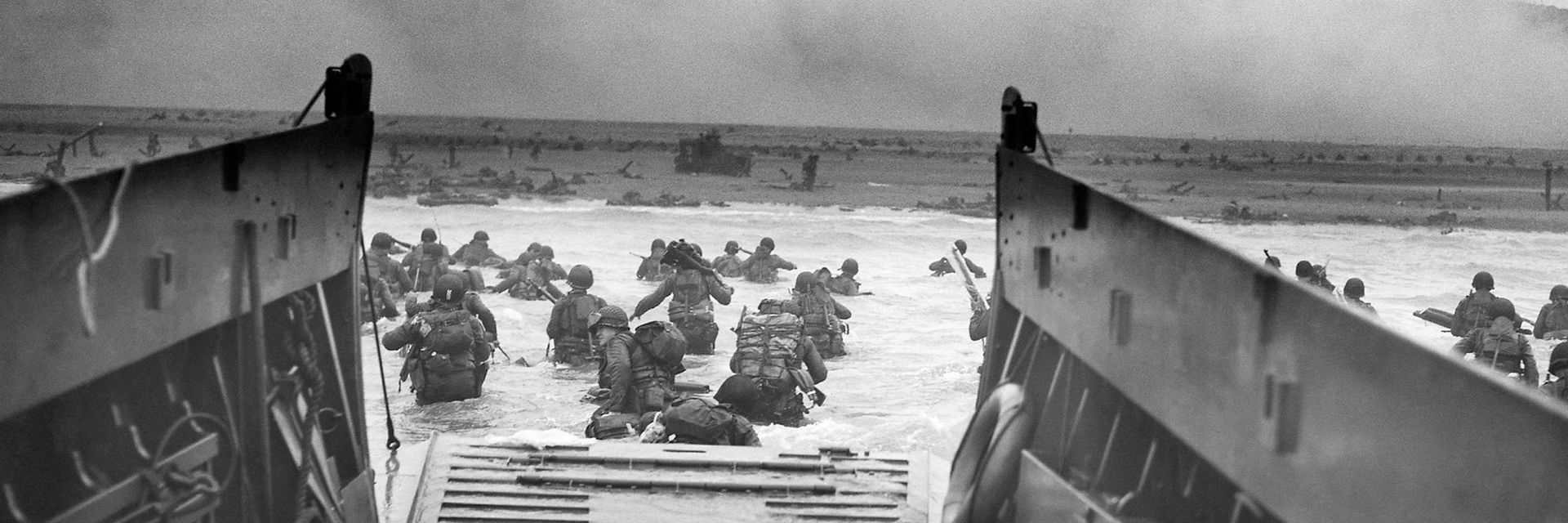On June 6, 1944, Allied troops stormed Normandy, France, effectively setting them on the path to winning World War II. Their efforts were the product of intricate, complex military planning, espionage, and cryptography, among other things – making D-Day’s success a precarious feat. However, it was very nearly unsuccessful. From Hitler’s arbitrary insistence on delaying the release of an advanced fighter jet, to General Eisenhower’s decision to exercise caution due to unsuitable weather, here are five ways that D-Day could have ended in failure.
◊
If you happen to visit the coast of Normandy, France, you might find yourself wandering along an idyllic beach, passing through tall grasses, hearing the crashing waves, and watching boats meander on the English Channel.
Perhaps you would stumble upon a lonely cemetery, located on a cliff above the waves, or maybe linger at a sculpture called Les Braves that resembles a collection of metallic sails. Or you might look down and notice a stray fragment of shrapnel glittering among the shells. These, of course, would be reminders of D-Day, the historic, game-changing invasion of Hitler’s “Fortress Europe” that placed the Allies on track to their ultimate victory in the second world war.
The culmination of years of ingenious espionage and strategic military planning that relied on total secrecy for success, the D-Day invasion of June 6 involved over 150,000 soldiers, 5,000 ships, and 13,000 aircraft. From the beaches at Normandy, the Allies forged a path through Western Europe that led to the final defeat of Nazi Germany less than a year later.
_13.png)
Normandy landings.
(Image courtesy of Supreme Headquarters Allied Expeditionary Forces, via Wikimedia)
LIMITED TIME FREE VIEW EVENT:
Jump into enemy territory by watching Episode 5 of MagellanTV's original series "Battlefields" FREE for a limited time only for the 75th anniversary of D-Day.
World War II’s outcome shaped modern history as we know it, and D-Day was among the most important factors in the Allies’ success. But D-Day (codenamed “Operation Overlord”) was also a precarious and risky project, dependent on a multitude of intricate factors. If only a few things had turned out differently, everything might have gone up in smoke.
Here’s how the Allies could have failed on D-Day – and perhaps lost the war.
1. If Hitler had released the Me-262 instead of delaying its development
One reason the D-Day landings succeeded was the establishment of complete air superiority over the battlefield. The Germans, who had lost many of their top pilots and whose Luftwaffe was being steadily depleted, were simply no match for the combined power of the British and American air forces.
However, the Germans had a secret weapon – the Me-262. This “wonder weapon” was capable of flying 540 miles per hour – making it over a hundred mph faster than the U.S.’s best aircraft, the P-51 Mustang. The world’s first turbo-jet fighter, its prototype actually took to the skies in 1938, but years passed before it became operational. Troubles with its jet engines partly accounted for the delays, but another factor was Hitler’s insistence that the Me-262 be a dual-purpose fighter-bomber. In the end, fewer than 300 fully operational Me-262s entered service in the Luftwaffe, and none of them reached the frontlines of battle.

The German Me-262 fighter jet.
(Image courtesy of U.S. Air Force, via Wikimedia)
Had the Germans been able to master and mass-produce the Me-262 sooner, they could have swarmed and out-flown the Allied air armada on D-Day, preventing hundreds of American C-47 transport planes from dropping their paratroopers on the Normandy countryside. Even without the Me-262, the Germans shot down 42 C-47s over Normandy, but the absence of the jet fighter all but guaranteed Allied air superiority.
2. If Dwight D. Eisenhower hadn’t delayed the invasion by one day
Imagine: You’ve spent years preparing for something, training for a battle from which you know you might never come home. In the wee hours of the morning, just hours before you're supposed to leave, you’ve packed your bags, said your tearful goodbyes, and . . . suddenly, you get word that the operation has been postponed by one day. Because of a little rain.
This was the fate of all involved in D-Day, which was originally scheduled for June 5th. The day before, however, Allied Supreme Commander Dwight D. Eisenhower decided to push it back by one day due to weather forecasts that warned a storm was coming into the English Channel.
The weather was an absolutely critical factor in D-Day’s timing. For months, Eisenhower had worked with a team of meteorologists to pinpoint the ideal date to launch the attack, but it was hard to get an exact read of the weather until preparations got down to the wire.
For success, D-Day needed to happen under the light of a full moon, for optimal visibility and a low tide at dawn, so the German defenses could be as exposed as possible. Meteorologists pinpointed June 5th through 7th as a three-day window that met these requirements. The attacks also required good weather, for high wind and rain could result in disaster, a death knell even if the plan itself was carried out perfectly.

Generals Eisenhower, Patton, and Bradley shortly after D-Day.
(Image courtesy of Wikimedia)
On June 5th, Canadian observers predicted a potential storm, but American forecasters recommended pushing ahead with the date anyway – so it was left to Stagg to make the final call. He suggested a delay, advising that June 6th would offer optimal weather conditions, and Eisenhower followed his lead.
German forecasters had actually predicted storms on the 5th and 6th, but in fact, the Luftwaffe’s meteorologists thought the stormy weather would run consistently until mid-June – so the Germans had basically let their guard down for the time being, and on the actual D-Day, many had abandoned their posts to go inland for a night off.
On the morning of June 6th, the weather was not perfect. The skies were cloudy and the seas were rough as Allied troops encroached on the Normandy shores. But, as Stagg had predicted, the weather cleared at noon. The sun came out, and its rays revealed one of the most stunning victories in history.
3. If the D-Day rehearsal, Operation Tiger, had gone differently
The saying bad rehearsal, good show rang true as D-Day approached. Operation Tiger was the mock-up for the invasion, and it was a spectacular failure.
Five weeks before D-Day was scheduled to start, the Allies rehearsed their invasion in England on a beach called Slapton Sands. The rehearsal was designed so they could simulate the beach landing, which they would put into practice for real in Normandy.
Unfortunately, what was supposed to be nothing more than a rehearsal turned into a serious and deadly reality. As the American and British soldiers were taking their places, German patrol boats appeared in the English Channel and attacked the squadron of American vessels. Over 700 soldiers were killed.

Slapton Sands beach in England.
(Image courtesy ofMaigheach-gheal, via Wikimedia)
Things went from bad to worse: The rehearsal plan had called for the British forces to open fire on the beach before the Americans arrived, so the soldiers could experience the sounds and smells of a war-torn beach. But there was a mixup in timing, and American soldiers arrived on shore as the British were still firing, leaving 30 more dead. Between the casualties from the German surprise attack and the deaths from the accidental British attack, nearly eight hundred Americans were killed in all, and the operation remained a secret for over 40 years.
Despite the casualties, Operation Tiger provided a multitude of lessons that may have been factors in the Allies’ victory at Normandy. Commanders ordered better life preservers and developed a system to save soldiers floundering in the water. Most importantly, they also standardized radio frequency communications to avert deadly mix-ups.
Still, the death toll of Operation Tiger raises the ever-knotty question: At what point do we stop risking some lives to save others?
4. If Alan Turing and his colleagues hadn’t made their breakthroughs in cryptography
If you’ve seen the film The Imitation Game, you might appreciate just how intricate and high-stakes Alan Turing’s cryptographic work was. Turing was a key member of a team that deciphered the Germans’ Enigma machine, allowing the Allies to break German codes. He was also instrumental in creating the Bombe code-breaking machine, which made it possible to detect the locations of German U-Boats prowling the Atlantic. But Turing’s crucial efforts could’ve failed for many reasons – namely if he hadn’t had the epiphany that allowed him to decipher the Enigma, or, perhaps worse still, if he had been outed for his homosexuality.
The main hub of British intelligence was located in Bletchley Park, a small government establishment just north of London. Its code name was Ultra. Turing was, perhaps, the most famous figure in Ultra’s top secret work, but he wasn’t the only one whose service was critical to breaking the German codes.

Portrait of Alan Turing.
(Image courtesy of Wikimedia)
Another notable contributor was British mathematician William Tutte, who cracked a German cryptographic machine called Tunny. This machine was more complex than Enigma, and worked directly through radio waves to send messages. Tutte succeeded in reading many of Tunny’s codes, some of which included German counter-preparations against an Allied invasion of northern France.
And let’s not forget Thomas Flowers, creator of Colossus, the world’s first large-scale programmable computer. Colossus was instrumental to making sense of many secret German messages that were intercepted by the British.
Without these three men and their diligent colleagues, D-Day and the war itself might have had a far different and more ominous outcome.
5. If the Germans had seen through the Allies’ complex web of lies
While Turing and the code-breakers were busy at Bletchley Park, another group that was critical to D-Day's success was living complex double-lives and taking hair-raising risks in order to further the Allied causes. They were the spies.
D-Day succeeded, in part, because many people were able to lie incredibly well. And some of these liars were able to gain the complete trust of the Germans from the inside. One was a lesser-known figure named Juan Pujol, aka Agent GARBO – a double agent for the British who was such a good actor that he was nicknamed after the Hollywood star, Greta Garbo.
Pujol was, in some respects, an ordinary but fascinating failure: he failed in most of his career attempts, and he failed in marriage. Yet he was a brilliant spy-in-waiting, and when World War II erupted, he developed a plan to make history.
Because he knew the British wouldn’t accept him right away – as he was, to them, a nobody – Pujol became a spy for the Germans first, and then developed an entirely fake identity as an English double agent. When at last he went to work for the British in reality, he proceeded to create entire fake battalions of agents and illusory “ghost” armies, which he used to confuse the Germans.

German double-agent Juan Pujol, aka "Garbo."
(Image courtesy of UK National Archives)
Pujol even had an instrumental role in D-Day’s success: As part of a plan called Operation Fortitude, he convinced the Germans that the Normandy attack was actually a diversion to draw attention from another, more important attack on Pas de Calais that would come later. He managed to persuade the German Commander-in-Chief, Field Marshal Gerd von Rundstedt, that he should not move his divisions to Normandy, thus creating the space that allowed Allied troops to gain a secure foothold in France on that fateful day.
If Juan Pujol had given up when the British thought he was just a “nobody” – or if the Germans had seen through his tangled webs of lies – the whole operation that was D-Day could have been nothing but a half-baked plan collecting dust in the National Archives.
Another notable spy was Virginia Hall. An American with a slight limp, she was responsible for more jailbreaks, sabotage missions, and leaks of Nazi plans than any other agent – earning the Gestapo’s recognition of her as “the most dangerous of all American spies.” Once, months before the D-Day invasion, she disguised herself as a 60-year-old woman, toured France, and organized sabotage missions against the German army. Hall was able to establish a resistance based out of Cosne, France before D-Day, eventually persuading 100 men to overcome their bias against working for a woman and reporting daily to London about the precise locations of German defenses. Had she given up and taken “no” for an answer, who knows what vital pieces of intelligence the Allies might have gone without.
Luckily, history had a different story in mind – for Hall successfully maneuvered her way through complex networks of German intelligence, ultimately providing information that would help the Allies win the war. Alongside Turing, Flowers, Pujol, and many others, she helped turn – the tide and catapulted the Allies towards victory – a victory that continues to resound 75 years later.
From start to finish, D-Day was a result of intricate military planning that relied on a delicate balance to succeed. It required total secrecy, massive numbers of troops, and tremendous individual and collective risk. Today, D-Day seems like an inevitable pinnacle of the Allies’ triumphant World War II victory. But you can imagine that the night before, as rain and high winds persisted, Eisenhower and all of his men must have tossed and turned, unsure if all of their careful planning would come together – or if the invasion would culminate in a tragic massacre on the beaches. However, we’re not all speaking German right now, so it sure seems like all the planning, espionage, and flat-out risk paid off in the end.
Title image courtesy of Robert F. Sargent, National Archives and Records Administration, via Wikimedia.

